Elston
Elston
The Story of the First African-American Yankee
Arlene Howard and Ralph Wimbish
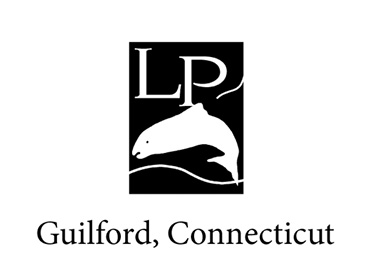

An imprint of Globe Pequot
Distributed by NATIONAL BOOK NETWORK
Copyright 2018 The Curators of the University of Missouri
Originally published in 2001 as Elston and Me by the University of Missouri Press
All rights reserved. No part of this book may be reproduced in any form or by any electronic or mechanical means, including information storage and retrieval systems, without written permission from the publisher, except by a reviewer who may quote passages in a review.
British Library Cataloguing in Publication Information available
A previous paperback edition was catalogued by the Library of Congress as follows:
Library of Congress Cataloging-in-Publication Data
Howard, Arlene.
Elston and me : the story of the first Black Yankee / Arlene
Howard and Ralph Wimbish.
p. cm.
Includes bibliographical references and index.
1. Howard, Elston, b. 1930. 2. Baseball playersUnited StatesBiography. 3. African American baseball playersBiography. 4. Howard, Arlene. 5. Baseball players spousesUnited StatesBiography. 6. New York Yankees (Baseball team)History. I. Wimbish, Ralph. II. Title.
GV865.H65 H69 2001
796.357'092dc21
[B] 2001041584
ISBN 0-8262-1358-8 (alk. paper)
ISBN 978-1-4930-2900-6 (paperback)
ISBN 978-1-4930-2901-3 (e-book)
 The paper used in this publication meets the minimum requirements of American National Standard for Information SciencesPermanence of Paper for Printed Library Materials, ANSI/NISO Z39.48-1992.
The paper used in this publication meets the minimum requirements of American National Standard for Information SciencesPermanence of Paper for Printed Library Materials, ANSI/NISO Z39.48-1992.
Printed in the United States of America
Foreword
by Don Newcombe
To say what type of human being Elston Howard was, I would have to start with Jackie Robinson. Jackie was a person I always described with three lettersM-A-N. Elston Howard was the same kind of person Jackie Robinson was. He was a MAN.
Elston and I were good friends. We were opponents only on the baseball field. We only got to see each other in spring training or when the Dodgers and Yankees played each other in the World Series. We had a couple of confrontations while he was with the Yankees, and he hit some bombs off me.
I often think back on how it was for Elston when he first joined the Yankees. They didnt want a black man on the Yankees even though the Dodgers had Jackie and had broken down the color barrier. The Yankees didnt want Elston, because of the innate prejudice at the time on that ball club and in that organization. And when Elston came, what he had to go through is somewhat the same as what Jackie had to face. I felt for Elston, because he was by himself to a degree. Larry Doby, of course, had broken the color barrier in the American League in 1948, and it should have been easier for Elston when he came along in 1955, but it wasnt.
He was an outstanding baseball player, an outstanding person, a man who made history. Elston should have been given more publicity in New York, the biggest media market in the world. They seemed to want to hold him down when he first got there. And Elston had to prove himself over and over again.
Elston hit two home runs off me in the World Series. In 1955, he homered off me in his first World Series at-bat. The pitch I threw in 1956 was a fastball, and just a case of getting it in the wrong spot. In that 1956 series, you know, I had good luck with Mickey Mantle. I struck him out twice, but Yogi Berra hit two home runs and Elston, of course, hit one. He was one of the greatest competitors I ever faced on the field, and we became good friends.
Elston Howard was a class act off the field as well. He moved into an area in Teaneck, New Jersey, he and his wife, Arlene, and their family. And he was respected and was one of the first black people to move into that community. Believe me, thinking back on my career and my life, I often thank God I was given the chance to play with people like Jackie Robinson and Roy Campanella and given the good fortune to play against people like Elston Howard. They were class people.
But theres more to it than being a renowned person with a uniform on or standing on the stage and doing whatever you do with your talent. Its what you do when you leave that stage or leave that arena that tells in my opinion their true character. Do you sign autographs for kids? Do you stay away from drugs? Do you stay away from abusing alcohol? Do you care about people? Thats the type of person I am talking about, and the category that I put Elston Howard in. I thank God I was able to pass Elston Howards way and have a chance to know him as a personmuch the same as I did with Jackie Robinson.
Don Newcombe, courtesy of Tom Reed, Members Only Television
Foreword
by Yogi Berra
One of the great things about the Yankees was being part of something special and playing with great players. We always pulled for each other; there were no jealousies, only great teammates. Thats why Ill always treasure the friends I made in my seventeen years with the Yankeesespecially Ellie Howard.
Ellie was truly one of the greatest guys I ever knew. We became very good friends, as did our wives. For years, Ellie and I would often eat and even shop togetherso did Carm and Arlene, who were very good pals. I remember they used to laugh at the clothes Ellie and I would buy on the road.
Ellie was a high-class guy, and a darn good ballplayer. We had several things in commonwe both came from St. Louis, were catchers, and made room for each other moving to the outfield. I dont remember Ellie ever griping or complaining about anything. I knew he faced some prejudice in spring training and probably felt a burden as the first black Yankee. But Ellie never caused any controversyhe was always pleasant to be around.
When Ellie first came up in 1955, no one on the Yankees really cared that he was the first black on our team. It wasnt a big deal. What mattered was that he was a good man who could help our team. When a bunch of us went out to eat, wed always make sure Ellie came along. I think he felt comfortable as a Yankee. Moose Skowron, myself, Phil Rizzuto, Mickey Mantle, all of us loved Ellie as our teammate.
I was still going good in 55I won the MVP that yearbut Ellie as a rookie was too good to keep out of the lineup. So Casey Stengel put him in left field. And it stayed that way for a few years. Bill Dickey used to work with Ellie, like he had done with me years earlier, and I think that helped. By 1960 they started putting me in the outfield more and Ellie behind the plate. He was the complete catcherhe did everything great. I remember Ryne Duren, who had bad eyesight, couldnt see Ellies hand signals so Ellie would signal the pitch by the number of crouches hed make.
Ellie had a lot of smarts and wouldve been a great manager. He really knew the game; he knew how to handle people. When we coached together with the Yankees, I know everyone respected his knowledge.
If you were Elston Howards teammate, you were a friend for life. In my museum at Montclair State University, one of my favorite pictures on the wall shows me with Ellie as he happily shared in the occasion of my two thousandth career hit. That was really special. So is one of those inscribed bricks that Arlene was the first to buy when we built the museum. The brick lies directly in front of the museum and says, Elston Gene Howard. If there were room, Id add, A great Yankee. A great friend.
Next page
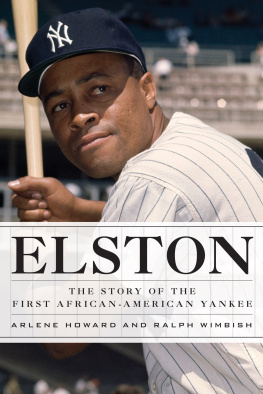

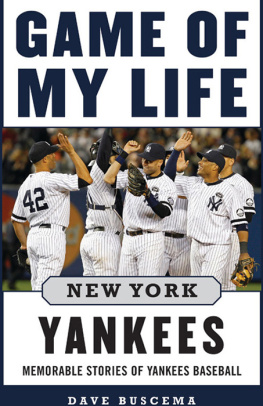

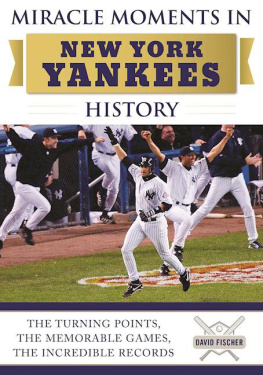
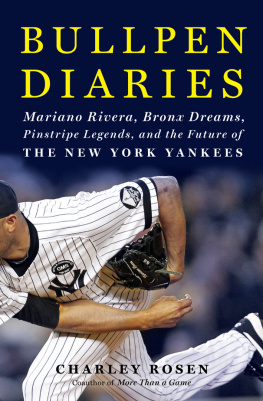
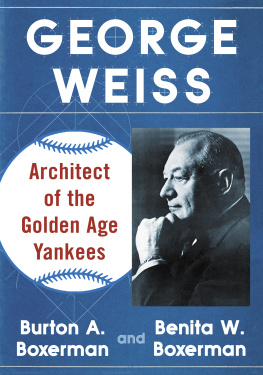
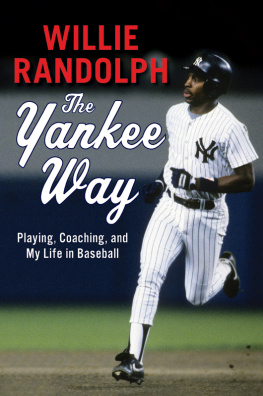


 The paper used in this publication meets the minimum requirements of American National Standard for Information SciencesPermanence of Paper for Printed Library Materials, ANSI/NISO Z39.48-1992.
The paper used in this publication meets the minimum requirements of American National Standard for Information SciencesPermanence of Paper for Printed Library Materials, ANSI/NISO Z39.48-1992.